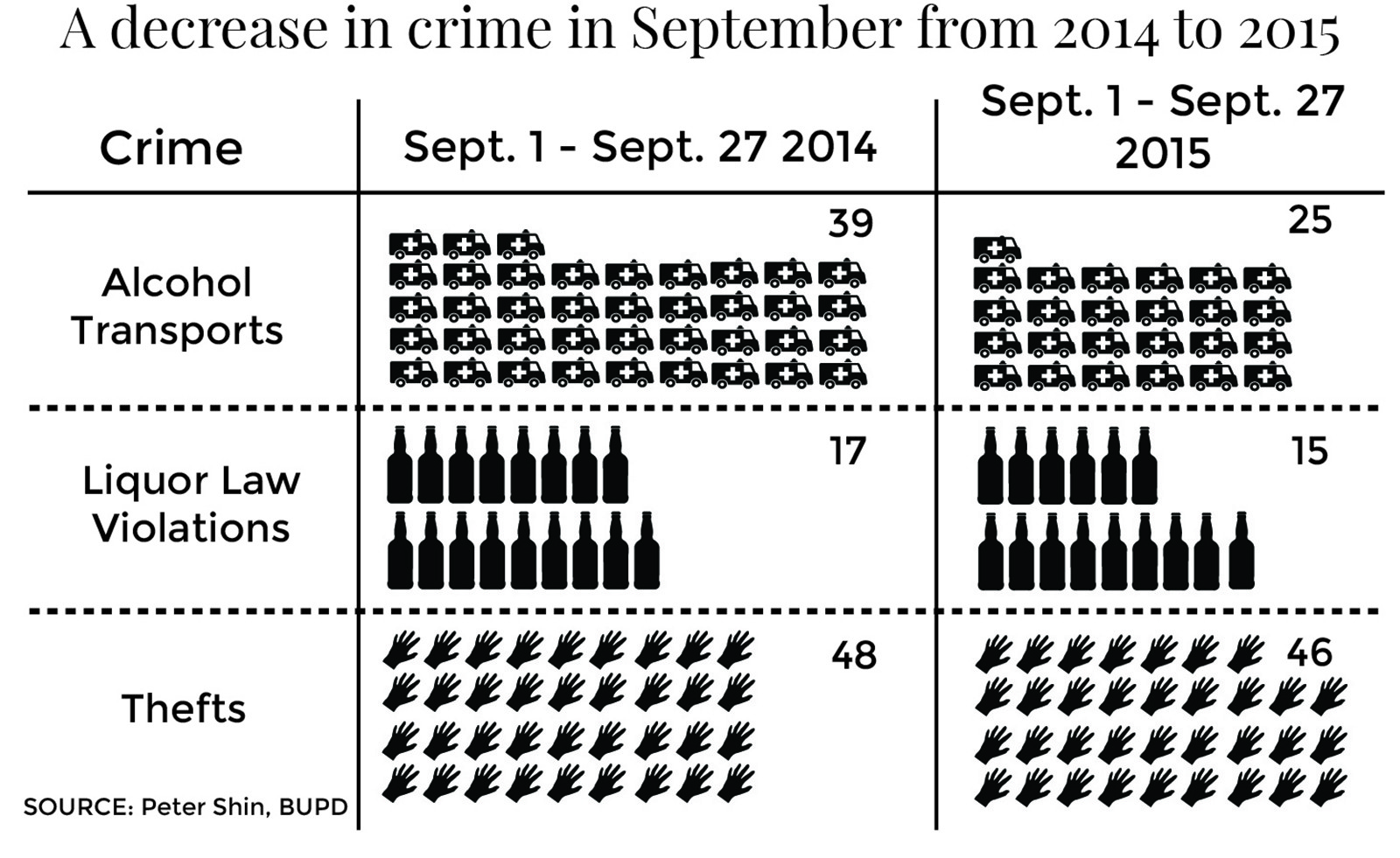
A month into the semester, data regarding crimes on Boston University’s Charles River Campus suggested several types of crime have dropped in frequency compared to fall 2014. BU Police Department statistics showed a slight decrease in thefts, liquor law violations and medical transports due to alcohol intoxication, said BUPD Officer Peter Shin.
Shin, who deals with crime analysis and statistics, said there have been slightly fewer thefts reported this year, from 48 incidents last year to 46. Liquor law violations also experienced a minute decline, from 17 violations reported last year to 15 this year. The numbers represented incidents reported between Sept. 1 and Sept. 27 of this and last year.
Shin said the number of people transported to the hospital due to alcohol consumption went through a bigger decrease in 2015. There were 39 people transported to the hospital in the 2014 period compared to only 25 in the 2015 period, Shin said.
Shin said he is unsure of the reasons behind the decrease in alcohol transports, because BUPD only deals with the enforcement aspect of the incidents.
Due to the unpredictability of crime, Shin said, there are times when a certain crime is reported significantly more than others are — theft, for example. With theft, it is often hard to solve the crime, but it depends on the location, Shin said.
“We have had some success, and we’ve caught some people, but [those were] in a case at [the Fitness and Recreation Center] where the building is monitored with cameras and you have to swipe into the building, so we have a pretty good idea when somebody steals something,” he said. “We don’t have the kind of ability to see who’s in the [George Sherman Union] at a particular time, so it makes it more difficult in those particular places.”
Shin said locking the door to rooms and residences is the number one crime prevention measure that the community can take.
“The biggest challenge is that the community changes every year … you lose your seniors and then comes a new group of around 4,000 students,” he said. “Other people might come from places where they don’t have to lock their doors at night, and the challenge is to educate them.”
Leah Barison, a mental health counselor at BU’s Wellness and Prevention Services, said she hopes her office’s services relate to the fewer crime reports associated with alcohol possession and consumption.
“We really take an educational approach to alcohol prevention and try to be as visible on campus as possible,” she said. “We did a focus group with students at BU last semester and a lot of feedback that we got was that they felt like the message from BU was just of the consequences, like they were being told, ‘Don’t drink. If you drink, you’re going to get in trouble.’”
Barison added that a new campaign for lower risk drinking launched in early September. The campaign focuses on creating a safe and supporting atmosphere, emphasizing that drinking is an option, not a necessity, Barison said.
“We also try to educate people that if they do choose to drink, there are ways that are lower risk. So maybe the people who choose to drink are doing so in a lower risk way,” she said. “We really look for people to get help for themselves and others and not fear getting into trouble.”
Several BU students said the general decline in the different crime categories indicates an ongoing effort to make campus safer.
William Krol-Sinclair, a junior in the Metropolitan College, said he believes theft and burglary are negligible already, given the size of the BU student body.
“BUPD updates everyone if anything happens, from emails, calls and texts, and for the amount of kids we have on campus, [the statistics] actually seems ridiculously small,” he said. “Then again, it’s not like we’re [University of Massachusetts Amherst] where here everyone’s in one giant campus, cause we’re kind of spread out.”
Julie Whiting, a junior in the College of Communication, said she thinks Wellness’ new approach to preventing unsafe alcohol consumption is relatable for students.
“Everyone’s just getting more aware of everything and getting smarter with their alcohol consumption, and people are getting over that ‘I need to [drink to] be cool thing,’” she said. “It makes me happy to know that people aren’t going to judge you for not drinking.”




















































































































